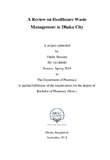| dc.contributor.advisor | Talukder, Mesbah | |
| dc.contributor.author | Hossain, Fahim | |
| dc.date.accessioned | 2018-11-29T07:02:43Z | |
| dc.date.available | 2018-11-29T07:02:43Z | |
| dc.date.copyright | 2018 | |
| dc.date.issued | 2018-09 | |
| dc.identifier.other | ID 14146040 | |
| dc.identifier.uri | http://hdl.handle.net/10361/10908 | |
| dc.description | This project report is submitted in partial fulfilment of the requirements for the degree of Bachelor of Pharmacy, 2018. | en_US |
| dc.description | Catalogued from PDF version of project report. | |
| dc.description | Includes bibliographical references (page 42-46). | |
| dc.description.abstract | This study reviews the existing condition of healthcare waste administration and practices in Dhaka, Bangladesh. The aim of this study is to evaluate the collection, handling, storing, and treatment and final disposal system of healthcare waste in Dhaka city. We composed existing evidence through an Internet search using the keywords ‘Hospital Squander Management,’ ‘Health Exposures,’ ‘Management of healthcare hazard,’ and ‘Dioxin emission’. Medical trashes that are predisposed in exposed places in the city are precarious and toxics. Moreover, trash administration and practices were found to be quite in dangerous situation. Healthcare wastes are risky because of its hazardous contamination might be responsible for horrible illnesses like hepatitis B and HIV/AIDS. Besides it poses severe fears to ecological health, which require specific action and administration prior to its final destruction. Deprived people accumulate the waste and sell it for recycling. Almost 85.0% of sharp wounds are triggered between their usage and subsequent destruction. More than 20.0% to them who carried them encounter “stick” damages. There is no initiative for current Medical waste management structure by administration or NGOs, and no solid rule has been established yet. Few scientists and NGOs tried to solve the problems but it was not sufficient. Waste pickers and waste cleaners are defenseless because they handle the trash with bare hands; revealing them to infection with HIV or hepatitis B and other illnesses. It is apparent from the complete study that it is essential to accept some vital strategies and followed by its implementation must needed to attain an effective medical waste administration system in Dhaka city. | en_US |
| dc.description.statementofresponsibility | Fahim Hossain | |
| dc.format.extent | 46 pages | |
| dc.language.iso | en | en_US |
| dc.publisher | BRAC University | en_US |
| dc.rights | BRAC University project reports are protected by copyright. They may be viewed from this source for any purpose, but reproduction or distribution in any format is prohibited without written permission. | |
| dc.subject | Healthcare | en_US |
| dc.subject | Waste management | en_US |
| dc.subject | Dhaka city | en_US |
| dc.subject.lcsh | Medical wastes -- Bangladesh | |
| dc.subject.lcsh | Health facilities -- Waste disposal. | |
| dc.title | A review on healthcare waste management system in Dhaka city | en_US |
| dc.type | Project report | en_US |
| dc.contributor.department | Department of Pharmacy, BRAC University | |
| dc.description.degree | B. Pharmacy | |

